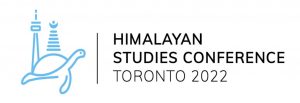
The Association for Nepal and Himalayan Studies (ANHS) is pleased to announce that the Himalayan Studies Conference 6 will be held at the University of Toronto, on the traditional land of the Huron-Wendat, the Seneca and the Mississaugas of the Credit, from October 13–16, 2022.

The central theme of the conference is “Himalayan Futures”. Positioned between the plains of the Indian subcontinent and the Tibetan Plateau, the Himalayas have become a captivating image in contemporary speculations about the meaning of the present and the possibilities of the future in the Anthropocene. The mountain range sits at the centre of both regional and global anxieties about the effects of climate change. Its ice-capped peaks are the source of Asia’s major river systems – and yet, melting snow and receding glaciers signal potential catastrophe in a region that is warming faster than the global average, affecting lives for millions of downstream populations through extreme weather events. Infrastructure development and extractivist capitalism pose further challenges to a geologically unstable region. Increasing state control, border conflicts and tensions over territorial claims manifest in the wake of these developments, complicating the geopolitical stakes for Himalayan nations and those with interests in the region. Meanwhile, communities experience, imagine and navigate change in diverse ways over time, giving rise to multifaceted cultural, artistic and activist expressions.
HSC6 aims to interrogate and upend popular discourses of apocalypse and crisis, and the linear temporalities in which they are embedded. The conference will attend to everyday lives, memories and future imaginaries in the Anthropocene across wide ranging themes, from ethnic politics and insurgencies, to literature, arts and religion. We strive, in particular, to foreground how Indigenous, Dalit and other historically marginalized communities bear witness, sustain hope and take action in the present. Envisioning alternative understandings and trajectories of environmental, social and political change, the conference will engage multidisciplinary perspectives of struggle and solidarity in the making of shared Himalayan futures.
We are excited to invite scholars of Himalayan Studies, development and planning practitioners, artists as well as activists to submit proposals for panels, roundtable discussions and individual papers.
Potential topics may include, but are not limited to:
- Politics, practices and institutions of climate change governance
- Indigenous ecopolitics and ontological frictions
- Utopian imaginaries in arts and literature
- Religious explorations of time and change
- Earthquakes and other natural disasters
- Affective ecologies and multispecies habitats
- Decolonization and movements for environmental justice
- Infrastructure investment, resource extraction and uneven development
- Borders, militarization and securitization
- Health, race/ethnicity and the environment
- Cities, architecture and urban planning
- Trade, migration and transnationalism
- Activist movements, practices and modes of expression
- Politics of knowledge production about the Himalayas
While adherence to the conference theme is not mandatory for acceptance, we especially welcome proposals drawing connection to Himalayan futures.
Submission Format
Panel proposals:
Panels feature 3-4 papers in 90-minute sessions. Panels can encompass more than one session. They may be organized by multiple conveners, ideally from different institutions, and may also include a discussant. All panels must have a chair to officiate the proceedings.
Roundtable discussions:
Roundtables comprise a group of scholars who discuss issues related to the conference theme. While a roundtable can include a short (5-10 minutes) introductory presentation, the main idea is to create a lively debate and engage with the audience.
Individual papers:
The organizing committee will group your individual paper together with similar paper proposals to form panels cohering around topics related to the conference theme. We will also assign your panel a chair.
Submission Process
You can organize and speak in more than one panel or roundtable. Proposals must mention the name of all authors/contributors and their titles, institutional affiliations and emails. Proposals must also include a title and abstract (max. 250 words). Please make sure to send your complete proposal to conference@anhs-himalaya.org before the deadline for submissions on April 10, 2022.
You will receive information about the acceptance of your proposal by May 15, 2022.
Keynote Speakers
Mona Bhan is Ford-Maxwell Professor of South Asian Studies and Associate Professor in the Department of Anthropology at Syracuse University. Her work focuses on the connections of economic development, humanitarianism, border wars and counterinsurgencies in Kashmir. More recently, she has also published on human and non-human entanglements in the Anthropocene. Mona Bhan’s keynote presentation will be followed by a discussion from Pasang Yangjee Sherpa, Assistant Professor of Lifeways in Indigenous Asia at the University of British Columbia.
Karine Gagné is Assistant Professor in the Department of Sociology and Anthropology at the University of Guelph. Her research explores human-animal relations and climate change through an ethics of care in Ladakh. Karine Gagné’s book Caring for Glaciers: Land, Animals, and Humanity in the Himalayas, published with the University of Washington Press, won the ANHS James Fisher Prize for First Books on the Himalayan Region in 2020. Mabel Denzin Gergan, Assistant Professor in Asian Environmental Studies at Vanderbilt University, will join us as a discussant of Karine Gagné’s keynote.
Please note that you must be an active member of ANHS to be eligible to participate at HSC6. If you are not already a member of ANHS, please visit the ANHS Homepage to register for membership and learn more about the conference.
Deadline: April 10, 2022